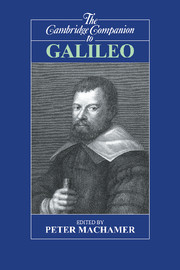Book contents
- Frontmatter
- Introduction
- 1 Galileo's Pisan studies in science and philosophy
- 2 Galileo's machines, his mathematics, and his experiments
- 3 The use and abuse of mathematical entities
- 4 Inertial problems in Galileo's preinertial framework
- 5 From Galileo to Augustine
- 6 Galileo's Copernicanism
- 7 Galileo's discoveries with the telescope and their evidence for the Copernican theory
- 8 Galileo on science and Scripture
- 9 Could there be another Galileo case?
- 10 The god of theologians and the god of astronomers
- 11 The never-ending Galileo story
- 12 The sepulchers of Galileo
- Bibliography
- Index
5 - From Galileo to Augustine
Published online by Cambridge University Press: 28 May 2006
- Frontmatter
- Introduction
- 1 Galileo's Pisan studies in science and philosophy
- 2 Galileo's machines, his mathematics, and his experiments
- 3 The use and abuse of mathematical entities
- 4 Inertial problems in Galileo's preinertial framework
- 5 From Galileo to Augustine
- 6 Galileo's Copernicanism
- 7 Galileo's discoveries with the telescope and their evidence for the Copernican theory
- 8 Galileo on science and Scripture
- 9 Could there be another Galileo case?
- 10 The god of theologians and the god of astronomers
- 11 The never-ending Galileo story
- 12 The sepulchers of Galileo
- Bibliography
- Index
Summary
Posuit Deus omnia in numero, pondere et mensura
Galileo, EN, vol. 4, 52In this essay, I will examine the relationship between Galileo's physics and his theology, focusing primarily on the latter. It is not my intention to minimize his commitment to physics - quite the contrary. But Galileo's interest in theology might seem remote given the secular status held by science today and, as a result, it would be tempting to dismiss theology as a textual relic corresponding to a fideistic atavism that is no longer present. However, it is precisely this secular perception of history that forces us to consider cultural relics of this sort.
Several recent studies of Galileo have tended to present his religious beliefs in one of two ways: as reflecting "genuine piety and devotion to the Church" or else as grounded in Baroque-court rhetoric and compliance with the Church's position. Otherwise, because of his Copernican campaign and trial, Galileo has also been included in the group of other theologically minded scientists such as Descartes, Boyle, and Newton – not to mention Pascal or Leibniz. Compared to these figures, Galileo's theological concerns appear as self-defense in the struggle between Copernican astronomy and biblical exegesis and completely separate from his physics.
- Type
- Chapter
- Information
- The Cambridge Companion to Galileo , pp. 175 - 210Publisher: Cambridge University PressPrint publication year: 1998
- 4
- Cited by



